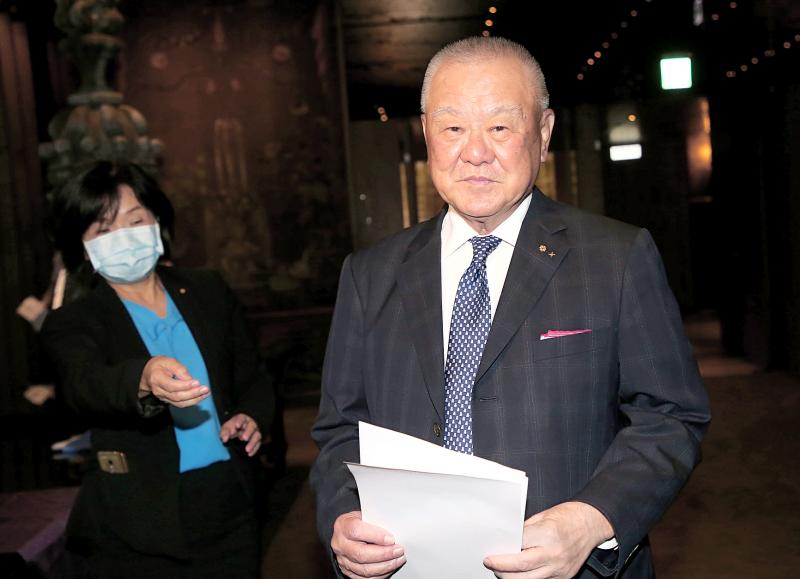Chinese National Association of Industry and Commerce (工商協進會) chairman Lin Por-fong (林伯豐) yesterday said that he would not attend a Taiwan-US economic dialogue scheduled for today.
Lin on Tuesday said that he received an invitation from the American Institute in Taiwan (AIT) to join the dialogue, at which US Undersecretary of State for Economic Growth, Energy and the Environment Keith Krach is to attend with his delegation.
“The association will not send a substitute, because there is no time to find one,” the Chinese-language Liberty Times (the Taipei Times’ sister newspaper) reported on its Web site yesterday, citing Lin.

Photo: CNA
The story cited sources saying that AIT does not like participants to talk about the event and conveyed its concerns after Lin spoke with the media.
Lin, who is chairman of Taiwan Glass Industry Corp (台灣玻璃) said that the association needs only to respond to the Ministry of Economic Affairs, because the ministry — not other institutes — is in charge of regulating and supporting local industries, he said.
Prior to Krach’s arrival, local media reported that he was to host the US-Taiwan Economic and Commercial Dialogue — a new platform established to bolster bilateral economic ties — after President Tsai Ing-wen (蔡英文) last month said that the government would work to lift restrictions on imports of US pork and beef, days after US Secretary of Health and Human Services Alex Azar visited Taiwan.

SEEKING CLARITY: Washington should not adopt measures that create uncertainties for ‘existing semiconductor investments,’ TSMC said referring to its US$165 billion in the US Taiwan Semiconductor Manufacturing Co (TSMC, 台積電) told the US that any future tariffs on Taiwanese semiconductors could reduce demand for chips and derail its pledge to increase its investment in Arizona. “New import restrictions could jeopardize current US leadership in the competitive technology industry and create uncertainties for many committed semiconductor capital projects in the US, including TSMC Arizona’s significant investment plan in Phoenix,” the chipmaker wrote in a letter to the US Department of Commerce. TSMC issued the warning in response to a solicitation for comments by the department on a possible tariff on semiconductor imports by US President Donald Trump’s

The government has launched a three-pronged strategy to attract local and international talent, aiming to position Taiwan as a new global hub following Nvidia Corp’s announcement that it has chosen Taipei as the site of its Taiwan headquarters. Nvidia cofounder and CEO Jensen Huang (黃仁勳) on Monday last week announced during his keynote speech at the Computex trade show in Taipei that the Nvidia Constellation, the company’s planned Taiwan headquarters, would be located in the Beitou-Shilin Technology Park (北投士林科技園區) in Taipei. Huang’s decision to establish a base in Taiwan is “primarily due to Taiwan’s talent pool and its strength in the semiconductor

An earnings report from semiconductor giant and artificial intelligence (AI) bellwether Nvidia Corp takes center stage for Wall Street this week, as stocks hit a speed bump of worries over US federal deficits driving up Treasury yields. US equities pulled back last week after a torrid rally, as investors turned their attention to tax and spending legislation poised to swell the US government’s US$36 trillion in debt. Long-dated US Treasury yields rose amid the fiscal worries, with the 30-year yield topping 5 percent and hitting its highest level since late 2023. Stocks were dealt another blow on Friday when US President Donald

UNCERTAINTY: Investors remain worried that trade negotiations with Washington could go poorly, given Trump’s inconsistency on tariffs in his second term, experts said The consumer confidence index this month fell for a ninth consecutive month to its lowest level in 13 months, as global trade uncertainties and tariff risks cloud Taiwan’s economic outlook, a survey released yesterday by National Central University found. The biggest decline came from the timing for stock investments, which plunged 11.82 points to 26.82, underscoring bleak investor confidence, it said. “Although the TAIEX reclaimed the 21,000-point mark after the US and China agreed to bury the hatchet for 90 days, investors remain worried that the situation would turn sour later,” said Dachrahn Wu (吳大任), director of the university’s Research Center for